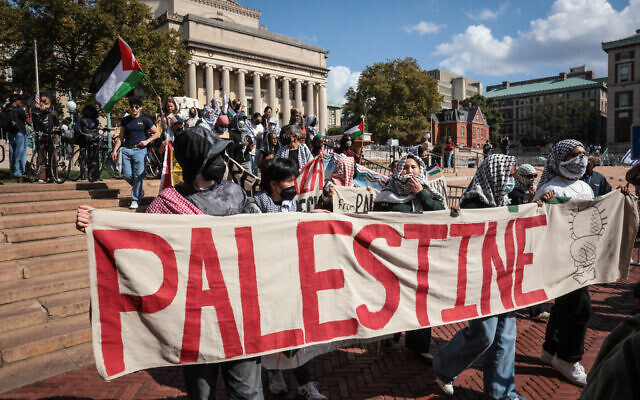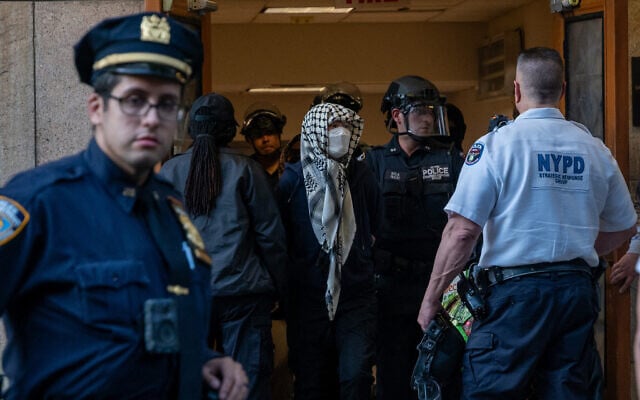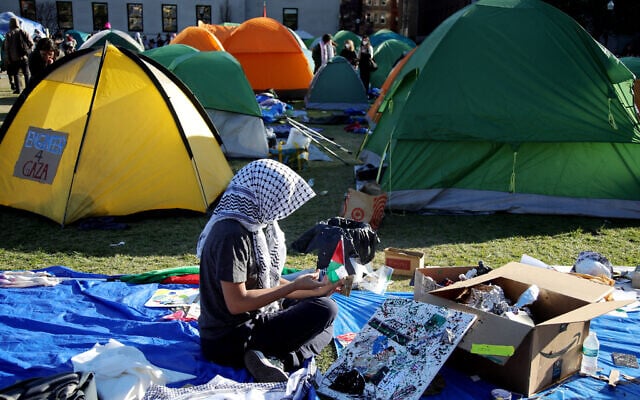



Nearly two-thirds of Jewish students at Columbia University reported feeling unaccepted for their religious identity, compared to 15% of students overall, during the school year that included the Hamas onslaught that sparked the war in Gaza, according to a report this week.
Jewish students were by far the most likely to report that political conversations about controversial topics strained their relationships during the 2023-2024 school year. And they were the most likely to say that they felt pressure to conform from their classmates — rather than, say, from their professors or school administrators — about their political beliefs.
The report was the third released by the Columbia University Task Force on Antisemitism, formed amid turmoil over pro-Palestinian, anti-Israel protests at the Ivy League school in New York City. The first report, released in March 2024, focused on rules about demonstrations, and the second, in August, surveyed Jewish students about their experiences.
The new report is based on an online survey from summer 2024 that asked Columbia students from all backgrounds about their experiences in the preceding school year. The survey was conducted by the Columbia task force in cooperation with the National Opinion Research Center at the University of Chicago.
More than half of Jewish students — 53% — said they experienced discrimination over their religious identity, compared to 43% of Muslim students and 10% of the total population. And while half of all students reported positive feelings of belonging at Columbia, only 34% of Jewish and 41% of Muslim students reported feeling that way.
Just over half of Muslim students reported frequently feeling not accepted for their identity — fewer than Jewish students, but far more than in the overall student population.
The survey found that 53% of Jewish students reported feeling personal danger for support of Jews or Israel, while 62% of Muslim students reported feeling personal danger for supporting Muslims or Palestinians.
“There were significant challenges, especially for Jewish and Muslim students, who frequently reported very different, and often more challenging, experiences than their peers who had other or no religious affiliations,� the report concluded.
The report comes as the school faces pressure from the Trump administration to address reports of antisemitism on its campus and many others. In March, the school acquiesced to a list of White House demands in a bid to win back $400 million in federal grants that were canceled over allegations of antisemitism at the school. Last month, over 70 anti-Israel protesters were arrested after occupying the main library on campus.
“There has been progress since the survey was done, but more is clearly needed,� Brian Cohen, the executive director of Columbia/Barnard Hillel, said in a statement, calling the survey “very significant and sobering.�
The university’s interim president — the third leader since the 2023-2024 school year — said in a statement that she was confident about improvements.
“We knew we would find the results disturbing, but we also knew that such information would be necessary in order to move forward,â€� Claire Shipman said in a statement. “Indeed, the results — that in the 2023-2024 academic year a majority of our Jewish students felt they were not accepted here because of their religious identity — confirm the undeniable and painful reality that we failed to adhere to our values and failed to meet the expectations we set for our campus community.â€�
US campuses have seen a steep increase in anti-Israel activity amid the war in Gaza, which was sparked when thousands of Hamas-led terrorists stormed southern Israel to kill some 1,200 people and take 251 hostages. A pro-Palestinian, anti-Israel encampment initiated at Columbia in the spring of 2024 triggered an international trend and caused many Jewish students on campus to report feelings of discomfort and isolation.
The Columbia task force’s new report found that 66% of Jewish students reported the encampment affected their daily routine “a great deal or somewhat,� and 70% of Jewish students strongly or mostly opposed the encampment.
It also found that 27% of Jewish students participated in protests to support Israel, while 12% participated in pro-Palestinian demonstrations.
Results were based on surveys completed by 9,150 Columbia students, out of a total of 35,607 enrolled in the 2023-2024 academic year. Students could choose whether or not to take the survey. Responses were statistically weighted based on demographic and other data from the Columbia registrar’s office, in accordance with standards set by the American Association for Public Opinion Research.



